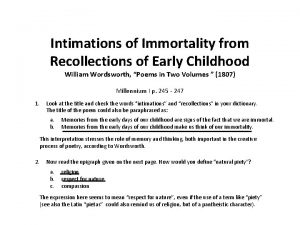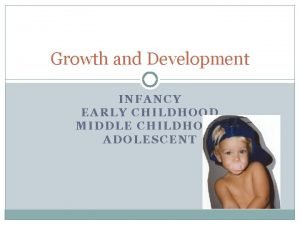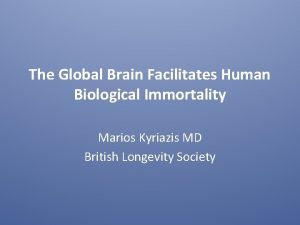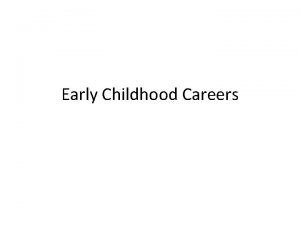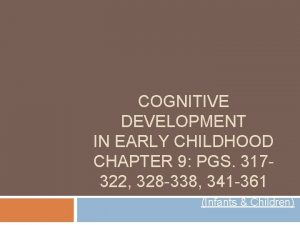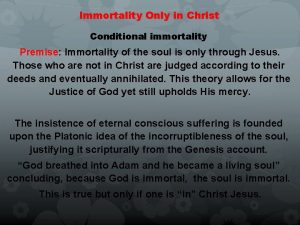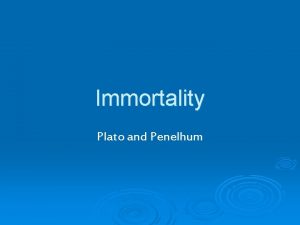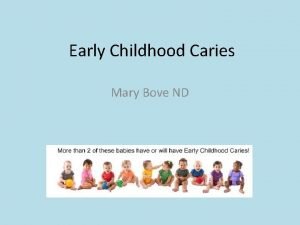Intimations of Immortality from Recollections of Early Childhood







- Slides: 7

Intimations of Immortality from Recollections of Early Childhood William Wordsworth, “Poems in Two Volumes ” (1807) Millennium I p. 245 - 247 1. Look at the title and check the words “intimations” and “recollections” in your dictionary. The title of the poem could also be paraphrased as: a. b. Memories from the early days of our childhood are signs of the fact that we are immortal. Memories from the early days of our childhood make us think of our immortality. This interpretation stresses the role of memory and thinking, both important in the creative process of poetry, according to Wordsworth. 2. Now read the epigraph given on the next page. How would you define “natural piety”? a. b. c. religion respect for nature compassion The expression here seems to mean “respect for nature”, even if the use of a term like “piety” (see also the Latin “pietas” could also remind us of religion, but of a pantheistic character).

Intimations of Immortality from Recollections of Early Childhood The Child is father of the Man And I could wish my days to be Bound each to each by natural piety. 1 There was a time when meadow, grove, and stream, The earth, and every common sight To me did seem Apparelled in celestial light, The glory and the freshness of a dream. It is not now as it hath been of yore; Turn wheresoe'er I may, By night or day, The things which I have seen I now can see no more. 2 The rainbow comes and goes, And lovely is the rose; The moon doth with delight Look round her when the heavens are bare; Waters on a starry night Are beautiful and fair; The sunshine is a glorious birth; But yet I know, where'er I go, That there hath past away a glory from the earth Il bimbo è il padre dell’uomo E vorrei quasi che i miei giorni fossero legati L’uno all’altro da naturale pietà Ci fu un tempo in cui prati, boschi, e ruscelli, La terra, e ogni spettacolo della natura A me apparivano Circonfusi di luce celestiale, La gloria e la freschezza di un sogno. Non è più ora come fu un tempo; Ovunque mi giro, Di giorno o di notte, Le cose che ho visto ora non posso più vedere. L’arcobaleno viene e va, Ed è leggiadra la rosa; Graziosamente la luna si guarda attorno Quando i cieli sono vuoti; I laghi nelle notti stellate sono uno spettacolo stupendo; L’alba è una nascita meravigliosa; Eppure io so, dovunque vada, che una gloria è scomparsa dalla terra.

5 Our birth is but a sleep and a forgetting; The Soul that rises with us, our life's Star, Hath had elsewhere its setting And cometh from afar; Not in entire forgetfulness, And not in utter nakedness, But trailing clouds of glory do we come From God, who is our home: Heaven lies about us in our infancy! Shades of the prison-house begin to close Upon the growing Boy, But he beholds the light, and whence it flows, He sees it in his joy; The Youth, who daily farther from the east Must travel, still is Nature's priest, And by the vision splendid Is on his way attended; At length the Man perceives it die away, And fade into the light of common day. La nostra nascita non è che sonno e oblio : L’anima, che nasce con noi, stella della nostra vita, Altrove ha avuto le proprie origini, E viene da lontano: Non del tutto dimentichi , Né in assoluta nudità, Ma traendo appresso nubi di gloria/splendore noi veniamo Da Dio, che è la nostra dimora: Il cielo ci circonda nella nostra infanzia! Ombre della prigione presto si addensano Sul bimbo che cresce, Ma lui contempla la luce, e da dove sgorga, La guarda ebbro di gioia; Il giovane, che si allontana ogni giorno di più dall’est Ancora adora/ammira la natura, E dalla visione splendente E’ accompagnato nel cammino; Infine l’uomo adulto la vede morire, E perdersi nella luce di ogni giorno.

GUIDED ANALYSIS 1. Read stanzas 1 and 2. a. – b. – What natural elements are mentioned? Meadows, woods, streams, the rainbow, the rose, the moon, the sunshine. How was their presence felt by the poet? They were all beautiful, surrounded by celestial light, and everything had the freshness of a dream. c. Quote the lines where the poet says that things have changed from the past. How do we know that the poet is referring to childhood? • • “It is not now as it hath been of yore” (l. 9), “The things which I have seen I now can see no more” (l. 12), “there hath past away a glory from the earth” (l. 21). We know that he is referring to childhood from the title and the epigraph, which are both of fundamental relevance to the meaning of the poem.

GUIDED ANALYSIS 2. a. – b. – Read stanza 5 Is the poet still reflecting on himself? No, his reflections are now addressed to the human condition in general. What does he compare birth to? He compares birth to “ a sleep and a forgetting” (neo-Platonic ideas). The soul, which remembers its origins, is imprisoned in the body, and each phase of growth represents a progressive widening of the distance between the soul and the light of heaven. c. How many stages of growth does Wordsworth describe? – Four. d. Describe what happens to man in each phase: – Child: the child is still very close to heaven, his birth place, and feels a deep joy in contact with nature. – Boy: this joy is still present in the growing Boy, but only in single moments of special happiness. – Youth: the Youth is still capable of being “Nature’s priest”, but this is the result of an effort and no longer a spontaneous gift. – Man: in the end the Man sees the joy of his contact with nature fade away.

GUIDED ANALYSIS 3. Consider the language. a. – b. – What kind of language does Wordsworth use? Does it correspond to his programme in the Preface to “Lyrical Ballads”? Wordsworth uses a clear language, modelled on spoken language, especially in the first two stanzas. This is in line with his programme, which aimed at a spontaneous language, void of traditional, rhetorical artifices. In stanza 5, though, where the tone is reflective and more philosophical, the language becomes more articulate. The adjective “common” is used twice? Does it have the same meaning in both cases? No, it hasn’t. In line 2 it is very positive, since it means “close to nature”, while in line 40 it means “everyday, part of everyday routine of human life”. The first meaning is more typical of Wordsworth.

WRITING NES 4. 1. 2. 3. 4. 1. 2. 3. 4. Answer these questions (maximum 80 words for each answer). Consider the Preface to “Lyrical Ballads” and define Wordsworth’s view of poetry. What are the different aspects of nature considered by Wordsworth in his nature poems? How does Wordsworth consider the ordinary world? Explain Wordsworth’s belief in the pre-existence of the soul as expressed in “Intimations of Immortality” Wordsworth regards poetry as the “spontaneous overflow of powerful feelings”, which produce a deep emotion which is the result of contemplation. The emotions he preferred were those of ordinary life, especially of simple people in the country. Poetry should use simple, ordinary language, but in such a way as to present ordinary things in an unusual way, tranfiguring them with “a certain colouring of imagination”. Nature is seen by Wordsworth as the countryside opposed to the confusion of the town. It is a source of joy and pleasure for the poet. But Nature is also a source of inspiration: the contact with nature allows the poet to see into “the life of things”. The third aspect is that of nature as a lifeforce, a living entity. God is present in nature and is not separable from it. (this view is also called pantheistic). The ordinary world is worth attention and respect. The simple life of humble country folk can teach the poet more lessons than a philosopher. By drawing our attention to the ordinary things in life, Wordsworth shows us that they are really great and inspiring. He substitutes the great epics of the past with shorter epic tales of simple country folk. Wordsworth believed that “the child is father of the man”, that is, all we are in our present originates in our past experiences. The child is closer to God than the adult, and so he is also closer to nature. The soul after birth gradually loses its perfect knowledge and cannot keep its deep union with the universe. For adults the deep union with universe is possible only in very short moments of vision.
